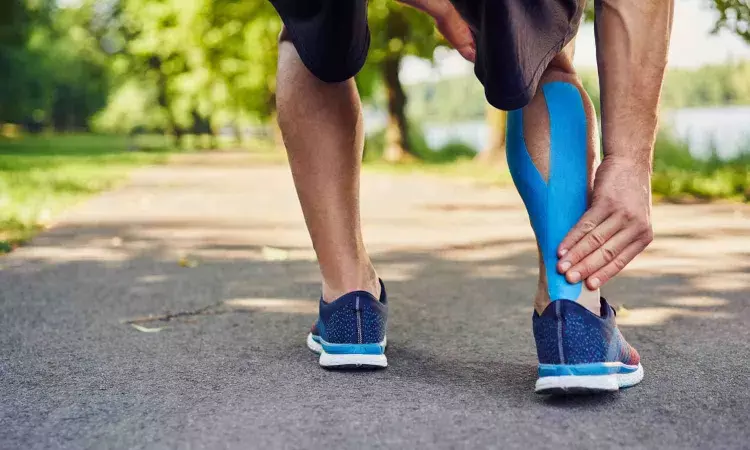- Home
- Medical news & Guidelines
- Anesthesiology
- Cardiology and CTVS
- Critical Care
- Dentistry
- Dermatology
- Diabetes and Endocrinology
- ENT
- Gastroenterology
- Medicine
- Nephrology
- Neurology
- Obstretics-Gynaecology
- Oncology
- Ophthalmology
- Orthopaedics
- Pediatrics-Neonatology
- Psychiatry
- Pulmonology
- Radiology
- Surgery
- Urology
- Laboratory Medicine
- Diet
- Nursing
- Paramedical
- Physiotherapy
- Health news
- Fact Check
- Bone Health Fact Check
- Brain Health Fact Check
- Cancer Related Fact Check
- Child Care Fact Check
- Dental and oral health fact check
- Diabetes and metabolic health fact check
- Diet and Nutrition Fact Check
- Eye and ENT Care Fact Check
- Fitness fact check
- Gut health fact check
- Heart health fact check
- Kidney health fact check
- Medical education fact check
- Men's health fact check
- Respiratory fact check
- Skin and hair care fact check
- Vaccine and Immunization fact check
- Women's health fact check
- AYUSH
- State News
- Andaman and Nicobar Islands
- Andhra Pradesh
- Arunachal Pradesh
- Assam
- Bihar
- Chandigarh
- Chattisgarh
- Dadra and Nagar Haveli
- Daman and Diu
- Delhi
- Goa
- Gujarat
- Haryana
- Himachal Pradesh
- Jammu & Kashmir
- Jharkhand
- Karnataka
- Kerala
- Ladakh
- Lakshadweep
- Madhya Pradesh
- Maharashtra
- Manipur
- Meghalaya
- Mizoram
- Nagaland
- Odisha
- Puducherry
- Punjab
- Rajasthan
- Sikkim
- Tamil Nadu
- Telangana
- Tripura
- Uttar Pradesh
- Uttrakhand
- West Bengal
- Medical Education
- Industry
Is surgery the best option for ruptured Achilles tendons in young adults?

There continues to be debate regarding the optimal treatment of acute Achilles tendon rupture (ATR). Over the past 15 years, a growing number of studies have compared nonoperative vs operative treatment of ATR, providing clinicians with estimates of treatment success and complication rates for these approaches.
An Achilles tendon rupture typically means surgery for many patients.
A research team led by Laurence Ge, M.D., an orthopaedic surgery resident mentored by Paul Talusan, M.D. at University of Michigan Health looked at the difference in outcomes of those treated with and without surgical procedures for their Achilles tendon ruptures in young adults.
While surgical Achilles tendon repairs reattach the torn tendon to help the torn pieces fuse together again, there is a rehab protocol that can avoid surgery. This protocol involves the patient flexing their foot down to help bring the pieces of the tendon close together during scarring, creating the same effect a surgical procedure would have.
The study looked at patients between the ages of 18 and 30 who are not athletes to assess their outcomes from both types of treatment for ruptured Achilles tendons.
“Patients under 30 years of age will typically receive a surgical repair when their Achilles tendon is ruptured due to being more physically active,” said Ge.
“However, our research showed that there is little difference between surgical repair and rehabbing the ruptured Achilles tendon when it comes to ability to function.”
The findings provide more treatment options for these patients.
“We hope that this will help reassure patients and physicians about the outcomes of non-surgical repairs for ruptured Achilles tendons,” said Ge.
“Regardless, it is always important to discuss with your physician what is best for you when it comes to these types of injuries.”
Reference:
Ge L, Saunders N, Betts D, Holmes JR, Walton DM, Talusan PG. Midterm Outcomes of Operatively and Nonoperatively Managed Achilles Tendon Ruptures in Young Adults. Foot Ankle Orthop. 2023 Sep 26;8(3):24730114231198849.
doi: 10.1177/24730114231198849
Dr Kamal Kant Kohli-MBBS, DTCD- a chest specialist with more than 30 years of practice and a flair for writing clinical articles, Dr Kamal Kant Kohli joined Medical Dialogues as a Chief Editor of Medical News. Besides writing articles, as an editor, he proofreads and verifies all the medical content published on Medical Dialogues including those coming from journals, studies,medical conferences,guidelines etc. Email: drkohli@medicaldialogues.in. Contact no. 011-43720751


